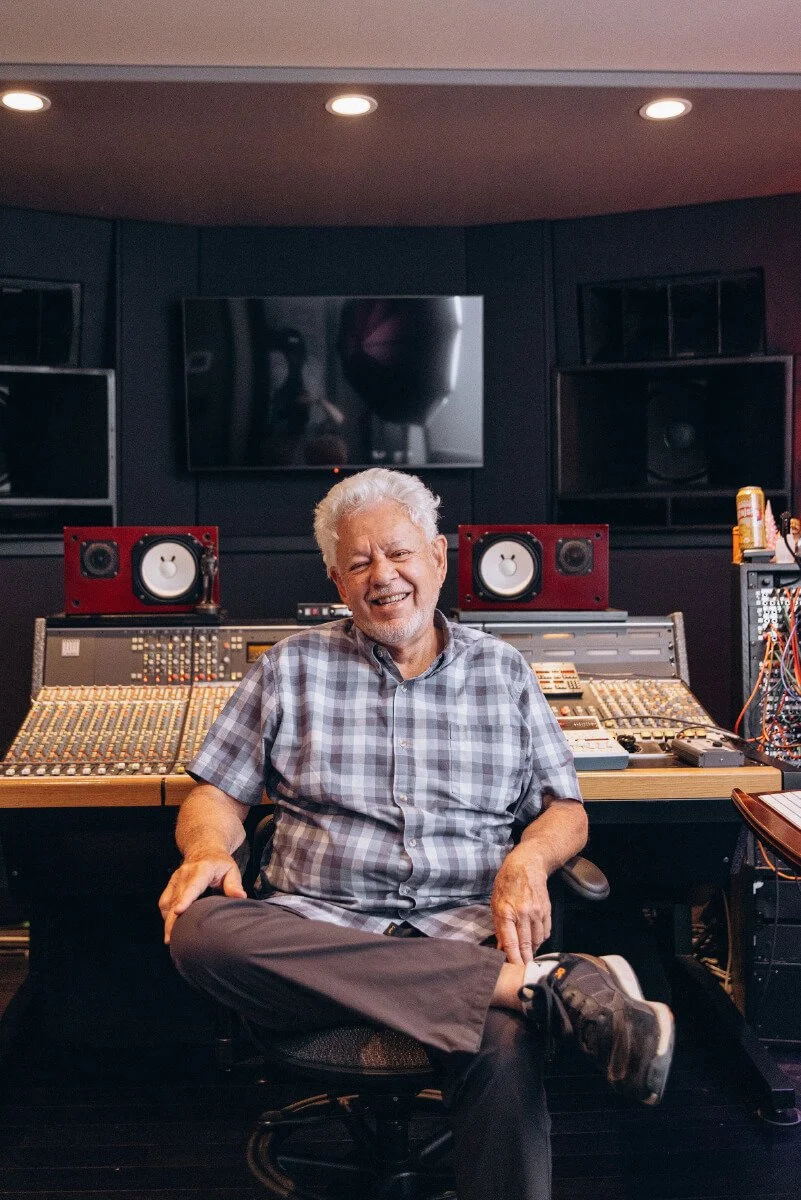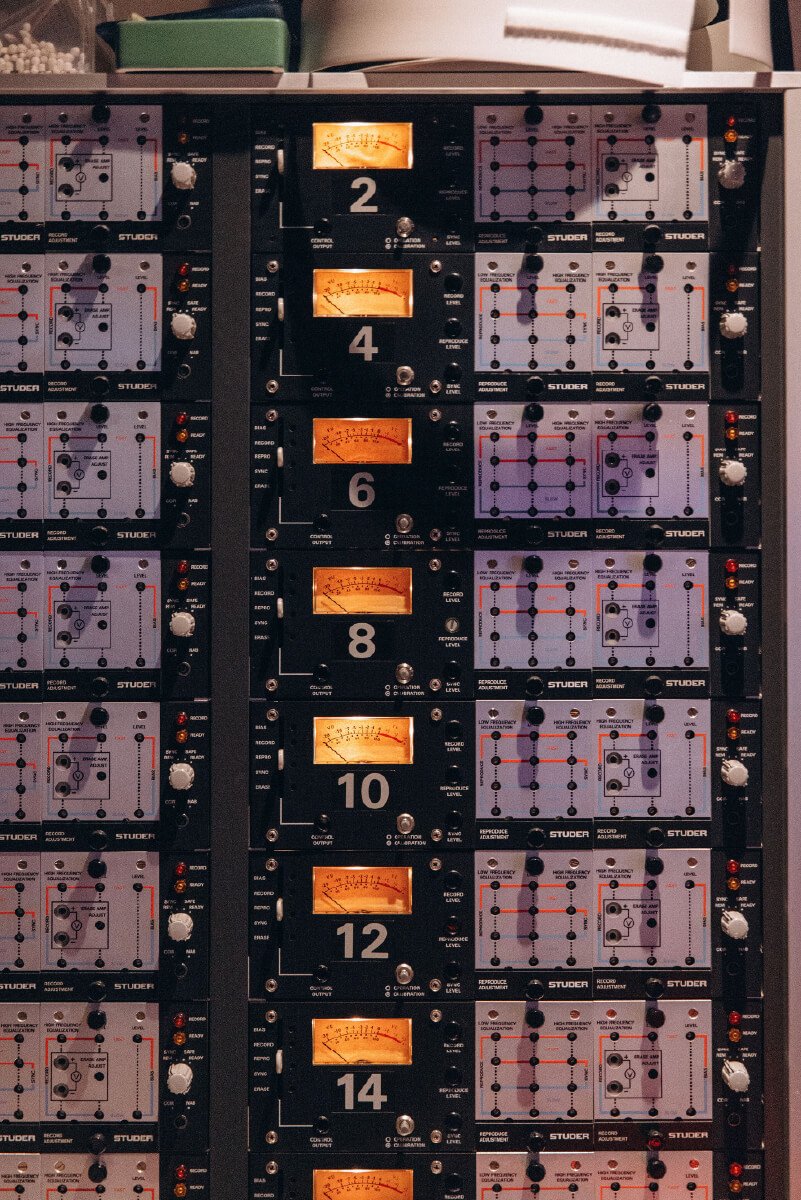Story By: Jayla Jackson
Photography By: Daniel Meigs
Featuring: Steven Durr
Nashville Design Week 2024
studio visit: steven durr, sound designer for emotion
Nashville has a rich history of music. From the Fisk Jubilee Singers to Dolly Parton, Music City is considered home to many singers and songwriters. However, few know the masterminds behind the music production side of things. Have you ever wondered what goes into making a record sound seamless or why you may have an emotional reaction to certain tunes more than others?
Steven Durr
Audio consultant, Steven Durr, holds a resume of design contributions which ranges from notable artists including Cher, Johnny Cash, and Willie Nelson to the Library of Congress, Opryland Park, and Nashville’s very own Pearl Cohn Magnet High School’s recording studio. In a meaningful conversation with Nashville Design Week, Durr expresses the good, bad, and ugly of sound engineering throughout the years while sharing his take on the future of music and live sound.
Jayla Jackson - I know you’re a man who wears many hats, but what would you consider yourself?
Steven Durr - Well, the luckiest human being in the world because I’ve never been to work a day in my life. This is all I’ve ever done my whole life and in my case, we’re really in the emotion business. We use audio and we use sound to translate emotions. Everything in auditory is an emotional experience. What I’ve been able to do is take the knowledge that I've gained and understand how to move people emotionally.
Jayla- So let’s go back in time - you’ve been in Nashville since 1979, could you share your experience then versus now?
Steven- I lived in New Orleans and worked in partnerships with a lot of nightclubs which is a very dangerous thing to do especially when you’re 25. Everything in New Orleans is emotional - food, music, I don’t care what it is, it was just an emotional place to be. When growing up there, I learned about the emotional aspects of music and from that…I wanted to find out how to take that and translate it to an audience whether it’s 1,000 people or 10,000 people. Moving to that space—Opryland—I was just getting started. Someone heard about the [sound] system I designed in New Orleans and offered me that job and to move me here. I was very reluctant at first because I had never heard of Roy Acuff, but I took the job and worked at Opryland. It almost makes you want to cry…it was one of the greatest experiences in the world.
I moved here in the 70s, but in the 80s, Nashville was the most amazing place on the planet. Everyone was neighborly, we all went to each other's studios, and worked together as a group. There was comradery. There were almost 300 recording studios at one point here in Nashville…there’s maybe only five or six left. I was fortunate enough to work in pretty much every single one of them. In the 90s, it started to change. My feeling is that the changes came from big corporations buying Sony, RCA and their writers’ catalogs. People stopped building recording studios because people can all of a sudden make records on their kitchen table with [Pro Tools]. So they started closing down and moving out.
Jayla- When this began happening, what’d you do for work?
Steven- I also have experience in live sound. I designed the sound system for the nine Nascar tracks with my business partner. We also did the chief’s stadium in Kansas City, Missouri which is still one of the greatest places in the world. These projects came about for me because there wasn’t much studio business. I also became the technical director at Indianapolis Motor Speedway which was a childhood dream. I wanted that more than anything in the world. Someone said you judge your success in life by how well you handle plan B.
Jayla- What is your thought process when designing sound systems and recording studios?
Steven- My thought process is that it’s not about money…it’s about understanding what kind of emotion I’m wanting to create. We did a club in New York and it plays so loud that you can’t breathe. I mean 125 decibels is not unusual. It sounds unbelievable. That choice of equipment is completely different from the equipment I chose for the studio of a Vietnamese opera singer. Everything that I’m choosing is a choice based on what outcome I expect from it. When I walk into a room - I can’t believe we’re having this conversation - I can listen to what the room is going to sound like before I even put pencil to paper.
Jayla- How?
Steven- Well because everything in life is based on dialogue. As long as you can understand what someone's saying, you’re great. If you go to a concert and the band sounds great you can’t understand the vocalist, the emotion immediately goes away. When we tune and calibrate studios and venues we tune with dialogue. We use a tape of a single person talking to determine okay, what we’re going to get out of it from vocals. We work backwards from there. You have to pick a loud speaker that compliments the acoustic environment of the space. If you go to a cathedral and don’t put sound on the walls, floor, and ceiling then it doesn’t matter what it’s made out of.
Jayla- Do you think there’s a decline in acousticians like you?
Steven- The speakers in my studio are from 1947 so they are as old as me. That generation of people had to work in a completely different environment than there is now. A 50 watt amplifier was a huge one.
Jayla- You’ve created recording and performance studios for clients like Lenny Kravitz, Disney, Willie Nelson, Vanderbilt University, and Mark Ronson. Are there similarities these clients look for when you’re designing for them?
Steven- They’re all unique. The only thing I can tell you is that I’m very careful. I don’t sell them anything and I’m very careful in being brutally honest with people. Nascar was a challenge because they had someone who had been doing it for 30 years. I was just like look, let me try and if you don’t like it that’s fine, no love lost. (It turned out great.) In Lenny’s case, he was wanting a studio in New York and he bought a brownstone with all glass and the skyline overlooking the Chrysler building. There was a lady next door and it was almost as if you could hear her heartbeat…the place was so quiet. I encouraged him to find some place else (for his studio) and Lenny said that’s where he wanted to build his studio. We were able to do it, but it was really hard. It goes back to the original part - I find out what people’s expectations are and decide whether I can do it or not.
Jayla- You did mention working in a lot of studios in Nashville, could you name a few for me?
Steven- Oh, they’re not here anymore! They’re gone. There was the Music Mill, Sound Stage, but they’re all gone. They tried tearing down RCA. I remodeled studio B.
Jayla- Why?
Steven-Mostly were turned into apartment complexes or other businesses. It’s unbelievable how many of those studios are gone. There may be a few more still standing but not as many as there once was when I first lived here.
Jayla-Why do you think there’s a lack of people who can operate a tape or tune sounds the way you do? It appears as if there’s a deprivation of that.
Steven- There is and I think that’s because that’s my whole focus. There’s two groups of people: one group is of technical people that only look at the math. They think if the math doesn’t look good then it’s not going to work. Then there’s the other group who think - if it doesn’t make me tear up then we’re not doing our job right. Malcolm Gladwell wrote the book that said something like you have to do something for 10,000 hours before you’re proficient at what you do. It’s the honest to God truth.
Jayla- Do you feel like people don’t want to put in the work to do that?
Steven- No they don’t. You have to have an encyclopedic knowledge of the basics of what you’re trying to do. I think some records suck because people don’t want to spend the time working on them enough.
Jayla- Do you see any ways that artificial intelligence could revolutionize sound engineering?
Steven- There’s no question about that. We also live in a society that celebrates mediocrity. We worked 12 hours a day for three days in a row on a sushi restaurant sound system because I’m not doing it half-ass. It’s not going to happen.
Jayla- Is there a moment in your design career that you look back on with pride?
Steven- Every one of them. It’s all been just a dream, you know? I’ve been really blessed and I’m grateful for every moment.
Jayla-Although earlier you made mention of mediocrity in today’s music society, what’s one thing that’s good about the evolution of music, creating sound systems and recording studios?
Steven- Oh that one is real easy. When I was growing up, the record companies had control of everything. They said who was going to be the star and who they’d put their money behind. Now, there’s no boundaries, no filters! There’s some unbelievable nuggets of music out there. Nobody is stopping you from doing what you want to do. The handicaps are what you put on yourself. You want to be something? There are no limits.



